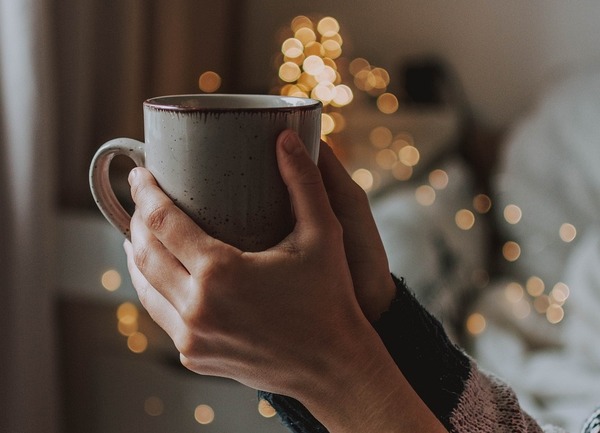What can we do to reduce anxiety naturally and feel calmer?
While most of us feel anxious at times, it can feel worse during the winter and can sometimes feel so intense it starts to interfere with daily life. Here are four ways to reduce low level anxiety and a solution for when the anxious feelings just won’t go away.
1. The essentials
Focusing on the essential things your body needs – light, movement, sleep and nutrition – is the number one way to reduce anxiety naturally and feel calmer. With these basics in place you’ll be better able to manage stress and keep anxiety levels lower:
Daylight
Getting outside every day for some fresh air and daylight, as early as possible in the day, is a brilliant way to boost your mood. Morning sunlight helps our bodies make the feel-good hormone serotonin, which is linked to feeling calmer and more positive. It also means our bodies release melatonin earlier in the evening which can help us sleep better at night.
Even though sunlight is in short supply in winter, we can still absorb it through cloud and rain, so at this time of year all daylight helps. Even a quick walk at lunchtime, sitting by a window or investing in a SAD lamp for your desk can help maximise the amount of light we’re exposed to.
We also need sunshine for vitamin D. Studies have shown that vitamin D can play a role in regulating mood and anxiety levels, so during autumn and winter the NHS advises adults to consider taking a daily supplement.
Exercise
Try to do some form of exercise every day, even if it’s just a walk round the block or some gentle yoga at home. Regular exercise helps relieve stress and increases the happy hormones dopamine and serotonin.
Sleep
Daylight and exercise during the day can mean we sleep better at night, and getting enough sleep is important to help keep anxiety at bay. Going to bed at the same time each night, keeping bedrooms dark and cool, avoiding caffeine after lunchtime and limiting screen use are all good habits to get into. The NHS has a useful leaflet with more tips.
Nutrition
Eating regular healthy meals with a good balance of protein, plants and slow-release carbohydrates, with healthy fish and plant oils and lots of water helps to regulate mood and keep you feeling balanced.
2. Try to live in the moment – focus on what is, rather than what might be
One of the worst things about anxiety is the ‘what if’ mindset we can get ourselves into, imagining all the things that may or may not happen. Bringing our attention back to the present moment by using grounding techniques can help us feel calmer.
This might be as simple as focussing on your breathing, or try the 5, 4, 3, 2, 1 grounding method: Notice 5 things you can see, 4 things you can feel, 3 things you can hear, 2 things you can smell and one thing you can taste. This gently moves your focus away from your anxious thoughts into the present moment.
3. Focus on what you can control, not on what you can’t
There are so many things in the world to worry about and they’re all shouting for our attention. This can send our brain into a panic as it tries to work out what to do about all of them, which in reality is usually nothing. It helps to focus on what we can actually control; on the small things that make a difference to our immediate environment, rather than on things we can’t do anything about. That could be doing something to help a friend or neighbour, or even volunteering in our community. Or it might be as simple as focussing on making our home a cosy and inviting place to be on a winter evening.

4. Make time for things that give you energy and joy
Spending time with friends or family, curling up with a good book, listening to music – make time for whatever activities help restore your energy and make you feel more positive. This can lower stress levels and shift your mind’s focus from the anxious feelings.
5. Psychotherapy – the right therapy can change the way you feel
Sometimes however, the anxiety can feel too strong – perhaps it’s stopping you sleeping or eating well or doing the things you enjoy. It might feel like none of the techniques you try are helping. Whether it feels like everything makes you anxious or whether it’s just one or two situations, the right kind of psychotherapy can help.
You might have tried therapy before. Some older forms of therapy aim to help you talk yourself out of the anxious feelings. This can be difficult as anxiety is an instinctive response which starts in your brain before you’re consciously aware of it. So by the time you realise what’s happening it’s already underway and it can be hard to stop it.
Luckily nowadays there are newer talking therapies that can reduce anxiety quickly by working in a very different way. One of the most effective therapies for anxiety is BWRT (BrainWorking Recursive Therapy). It’s a modern talking therapy that can quickly help you feel calmer, happier and more confident. Often it can just take a single session with a therapist to reduce the anxiety for good.
BWRT is now used by psychologists, counsellors, therapists and psychiatrists worldwide. It is so effective because it works at the point your brain first chooses an anxious response, before you’re even aware of it. You choose how you’d prefer to feel instead and BWRT quickly teaches your brain that’s what it should do. You can find yourself feeling calmer and less anxious straightaway.
There’s more information about BWRT here, or for a chat about how BWRT can help with your anxiety, email me at: bwrtcambridge@gmail.com

